-
03-06-2023
Palliative care strategies in the management of people with serious cases of COVID-19
Revista Brasileira de Enfermagem. 2023;76:e20220308
Abstract
Palliative care strategies in the management of people with serious cases of COVID-19
Revista Brasileira de Enfermagem. 2023;76:e20220308
DOI 10.1590/0034-7167-2022-0308
Views0See moreABSTRACT
Objectives:
to analyze the assistance strategies in palliative care developed in the COVID-19 pandemic for critically ill patients and their families.
Methods:
an integrative review carried out in August 2021 and updated in April 2022 in the Base de Dados de Enfermagem (BDENF), Cumulative Index to Nursing and Allied Health Literature (CINAHL), Medical Literature Analysis and Retrieval System Online (MEDLINE), US National Library of Medicine (PubMed), Web of Science databases, and presented in the PRISMA flowchart.
Results:
thirteen works were selected for reading and content analysis, from which emerged the two main themes that reflect the reality evidenced in this context: The sudden advent of COVID-19 with impacts on palliative care; and The strategies used in palliative care to mitigate these impacts.
Final Considerations:
palliative care is the best strategy for providing health care, used as a comfort to bring relief and comfort to patients and families.

-
ORIGINAL ARTICLE03-06-2023
The pandemic changes daily life and ways of living: technosociality and user/families experiences
Revista Brasileira de Enfermagem. 2023;76:e20220177
Abstract
ORIGINAL ARTICLEThe pandemic changes daily life and ways of living: technosociality and user/families experiences
Revista Brasileira de Enfermagem. 2023;76:e20220177
DOI 10.1590/0034-7167-2022-0177
Views0See moreABSTRACT
Objectives:
understand the changes imposed by the COVID-19 pandemic in the daily lives of users of Primary Health Care and their families and its impact on self-care and health promotion.
Methods:
this is a holistic-qualitative multiple case study, based on the Comprehensive Sociology of Everyday Life, in which 61 users participated.
Results:
experiencing a new daily life in COVID-19 pandemic times, users express their feelings, adaptation to new habits and ways of living. Health technologies and virtual social networks stand out in helping with everyday tasks, in communicating with loved ones and health professionals, and in validating dubious information. Faith and spirituality arise in the face of uncertainty and suffering.
Final Considerations:
it is imperative to pay close attention to the changes in daily life caused by the COVID-19 pandemic, in order to offer care directed to the singular and collective needs.

-
ORIGINAL ARTICLE03-06-2023
Construct elaboration and validity of the Pregnancy Depression Risk Scale
Revista Brasileira de Enfermagem. 2023;76(2):e20220306
Abstract
ORIGINAL ARTICLEConstruct elaboration and validity of the Pregnancy Depression Risk Scale
Revista Brasileira de Enfermagem. 2023;76(2):e20220306
DOI 10.1590/0034-7167-2022-0306
Views0See moreABSTRACT
Objectives:
to elaborate and analyze the Pregnancy Depression Risk Scale psychometric properties.
Methods:
methodological research, in six steps: theoretical model empirical definition; elaboration of scale items with literature review; consultation with five professional health experts and 15 pregnant women; content validity with six experts; pre-test-semantic validity with 24 pregnant women; scale factor structure definition with 350 pregnant women; pilot study with 100 pregnant women, totaling 489 pregnant women and 11 experts. Data were analyzed by content analysis, exploratory factor analysis, multitrait-multimethod analysis and internal consistency.
Results:
sixty-eight risk factors were identified for item formulation. The final version of the scale consisted of 24 items in five domains. The scale demonstrated satisfactory construct content, semantic, validity and reliability.
Conclusions:
the scale proved to be valid in terms of content and semantics, with a factor structure defined according to the adopted theoretical model and satisfactory psychometric properties.
-
REVIEW03-06-2023
Nursing protocols to reduce urinary tract infection caused by indwelling catheters: an integrative review
Revista Brasileira de Enfermagem. 2023;76(2):e20220067
Abstract
REVIEWNursing protocols to reduce urinary tract infection caused by indwelling catheters: an integrative review
Revista Brasileira de Enfermagem. 2023;76(2):e20220067
DOI 10.1590/0034-7167-2022-0067
Views0See moreABSTRACT
Objectives:
to analyze the production of knowledge in research articles about the effectiveness of nursing protocols for reducing indwelling urinary catheter dwell time and catheter-associated urinary tract infection rate in hospitalized adult and older patients.
Methods:
an integrative review of three full articles, available in the MEDLINE Complete – EBSCO, Scopus and Web of Science databases, from 01/01/2015 to 04/26/2021.
Results:
the three protocols reduced infection rates, and from the review/synthesis of their knowledge, a level IV body of evidence emerged to compose the nursing care process aimed at reducing indwelling urinary catheter dwell time and catheter-associated urinary tract infection.
Final Considerations:
this process gathers scientific evidence to support the elaboration of nursing protocols and, consequently, the conduction of clinical trials on its effectiveness in reducing urinary tract infection by indwelling urinary catheter.

-
ORIGINAL ARTICLE03-06-2023
Medication reconciliation in pediatrics: a validation of instruments to prevent medication errors
Revista Brasileira de Enfermagem. 2023;76(2):e20210755
Abstract
ORIGINAL ARTICLEMedication reconciliation in pediatrics: a validation of instruments to prevent medication errors
Revista Brasileira de Enfermagem. 2023;76(2):e20210755
DOI 10.1590/0034-7167-2021-0755
Views0See moreABSTRACT
Objectives:
to develop and validate the content of two instruments for promoting medication reconciliation for the transition of care of hospitalized children.
Methods:
methodological study, conducted in five stages: scope review for conceptual structure; elaboration of the initial version; content validation with five specialists using the Delphi technique; reassessment; and construction of the final version of the instruments. A content validity index of at least 0.80 was adopted.
Results:
three rounds of evaluation were carried out to reach the validity index of the proposed contents, whereas a new analysis of 50% of the 20 items of the instrument aimed at families, and 28.5% of the 21 items aimed at professionals was necessary. The instrument aimed at families reached an index of 0.93, and the instrument for professionals, 0.90.
Conclusions:
the proposed instruments were validated. It is now possible to proceed with practical implementation studies to identify their influence on safety during medication reconciliation at transition of care.

-
ORIGINAL ARTICLE03-06-2023
Organizational politics and professional struggles in nursing
Revista Brasileira de Enfermagem. 2023;76(1):e20220180
Abstract
ORIGINAL ARTICLEOrganizational politics and professional struggles in nursing
Revista Brasileira de Enfermagem. 2023;76(1):e20220180
DOI 10.1590/0034-7167-2022-0180
Views0See moreABSTRACT
Objective:
to analyze the professional struggles between nursing organizational entities, in Rio de Janeiro, during the Regional Nursing Council’s electoral process (1990-1993 administration).
Method:
historical study. We used journalistic articles, normative documents, legislation and semi-structured interviews with five nursing professionals who participated in this process. Interpretation of findings was supported by Bourdieu’s concepts of habitus, field, capital, and symbolic power.
Results:
Electoral Code changes of the aforementioned council, under the influence of administration (1987-1990), candidate for re-election, influenced the disclosure and eligibility criteria, making it difficult for broad participation, especially of Associação Brasileira de Enfermagem Rio de Janeiro Section.
Final considerations:
nursing, in this period, generated a field of disputes related to positions of power and gender, which was evidenced in the electoral process studied, which highlighted using limiting strategies by a group, making it difficult for the entire category to participate.
-
02-06-2023
Proyecto Termómetro Social COVID-19: articulaciones transnacionales para abordar poblaciones en situación de vulnerabilidad social
Revista Brasileira de Enfermagem. 2023;76:e76suppl201
Abstract
Proyecto Termómetro Social COVID-19: articulaciones transnacionales para abordar poblaciones en situación de vulnerabilidad social
Revista Brasileira de Enfermagem. 2023;76:e76suppl201
DOI 10.1590/0034-7167.202376suppl201es
Views0El COVID-19 es una enfermedad infecciosa que ha impactado significativamente diferentes contextos alrededor del mundo, directa y/o indirectamente, y en mayor escala en países pobres y/o en vías de desarrollo(). No sabemos con certeza los efectos acumulativos del COVID-19 en las poblaciones (trastornos mentales, insomnio, ansiedad, trombosis, déficit cognitivo, problemas de memoria, etc.) tras la […]See more -
02-06-2023
COVID-19 Social Thermometer Project: transnational articulations to approach populations in situations of social vulnerability
Revista Brasileira de Enfermagem. 2023;76:e76suppl201
Abstract
COVID-19 Social Thermometer Project: transnational articulations to approach populations in situations of social vulnerability
Revista Brasileira de Enfermagem. 2023;76:e76suppl201
DOI 10.1590/0034-7167.202376suppl201
Views0COVID-19 is an infectious disease that has significantly impacted different contexts around the world, directly and/or indirectly, and on a larger scale in poor and/or developing countries(). We do not know for sure the cumulative effects of COVID-19 on populations (mental disorders, insomnia, anxiety, thrombosis, cognition deficit, memory problems, etc.) after exposure to infection by […]See more
-
ORIGINAL ARTICLE10-07-2024
Consequences of the legislation issued for nursing education in times of COVID-19 (2020-2022)
Revista Brasileira de Enfermagem. 2024;77(5):e20230375
Abstract
ORIGINAL ARTICLEConsequences of the legislation issued for nursing education in times of COVID-19 (2020-2022)
Revista Brasileira de Enfermagem. 2024;77(5):e20230375
DOI 10.1590/0034-7167-2023-0375
Views0See moreABSTRACT
Objectives:
to analyze the legislation issued during the COVID-19 pandemic for nursing education and immediate consequences.
Methods:
documentary research, whose source was the legislation issued for nursing education during the COVID-19 pandemic. Thirty-two documents were analyzed and submitted to a collection instrument.
Results:
contradictions and consequences for nursing education following the guidelines and law of guidelines and bases were revealed. The consequences of the law affected the quality of teaching, equal access, exemption from minimum school days and course abbreviation. Regarding the guidelines, there was a lack of conditions for developing skills, in addition to the attempt to update them. Concerning internships, acting during the pandemic put students at risk, and their abbreviation prevented them from consolidating knowledge and skills.
Final Considerations:
remote teaching did not guarantee the quality and equality of teaching, weakened the development of skills, not taking into account nursing’s educational needs.

-
ORIGINAL ARTICLE09-30-2024
Giving new meaning to the impact of touch in Shantala massage: mothers’ perceptions of maternal and child well-being
Revista Brasileira de Enfermagem. 2024;77:e20240012
Abstract
ORIGINAL ARTICLEGiving new meaning to the impact of touch in Shantala massage: mothers’ perceptions of maternal and child well-being
Revista Brasileira de Enfermagem. 2024;77:e20240012
DOI 10.1590/0034-7167-2024-0012
Views0See moreABSTRACT
Objectives:
to understand maternal perceptions of maternal and child well-being based on Shantala massage and discuss its association with the third Sustainable Development Goal.
Methods:
a descriptive-exploratory study in the light of Symbolic Interactionism. Eight women, mothers of infants, participated in five online meetings to teach Shantala massage, collected in focus groups, between November and December 2021. The data was subjected to thematic content analysis and lexical analysis with IRAMUTEQ®.
Results:
two categories emerged, 1) Maternal perceptions of Shantala massage and its promotion of child well-being and 2) Maternal perceptions of Shantala massage and its impact on their well-being, interconnected with subcategories.
Final Considerations:
Shantala massage promoted mutual impacts on maternal and child well-being, working together to achieve the third Sustainable Development Goal.

-
ORIGINAL ARTICLE09-30-2024
Educational video for adherence to vaginal pessary in pelvic organ prolapse treatment
Revista Brasileira de Enfermagem. 2024;77:e20230515
Abstract
ORIGINAL ARTICLEEducational video for adherence to vaginal pessary in pelvic organ prolapse treatment
Revista Brasileira de Enfermagem. 2024;77:e20230515
DOI 10.1590/0034-7167-2023-0515
Views0See moreABSTRACT
Objectives:
to construct and assess an educational video to promote the adherence of women with pelvic organ prolapse to vaginal pessary use.
Methods:
this is a methodological study, with a longitudinal design and quantitative analysis. The pre-production (synopsis, argument, script, storyboard), production and post-production stages were covered. Content and technical assessments were carried out by judges from the health and communication areas, respectively, and appearance assessment by the target audience.
Results:
the video was the first to be developed on the topic on the national scene, considered assessed from the point of view of appearance and content, presenting an overall Content Validity Index of 0.99 and a level of agreement among judges of 91.1% to 100%. Assessment by the target audience reached a percentage of 96% to 100%.
Conclusions:
the educational video is an instrument capable of promoting adherence to pessary in women indicated for this therapeutic approach.

-
EXPERIENCE REPORT09-30-2024
Health promotion of long-haul truck drivers and their families
Revista Brasileira de Enfermagem. 2024;77:e20230511
Abstract
EXPERIENCE REPORTHealth promotion of long-haul truck drivers and their families
Revista Brasileira de Enfermagem. 2024;77:e20230511
DOI 10.1590/0034-7167-2023-0511
Views0See moreABSTRACT
Objectives:
to describe the development of a Health Information and Communication Technology for the health care of long-haul truck drivers and their families.
Methods:
this is a description of the development of an Information and Communication Technology, developed from March to September 2023, following the systematization of the experience in five steps: 1) starting point, 2) initial questions, 3) recovery of the lived process, 4) background reflection, and 5) arrival points.
Results:
the technology called “Work-Family Balance,” electronically available, presents resources for the health care of long-haul truck drivers. It is anchored in studies on the health of long-haul truck drivers, notes from the International Labor Organization, the Strategic Action Plan for Confronting Chronic Diseases and Non-Communicable Diseases in Brazil, 2021-2030, and the Declaration by the International Association of Family Nursing.
Final Considerations:
the theoretical improvement of nursing can potentially improve the health care of long-haul truck drivers, prevent Chronic Non-Communicable Diseases, and promote work-life balance to achieve the goals of Agenda 2030.

-
09-23-2024
Política Nacional de Cuidados Paliativos: reflexões a partir da Agenda 2030 para o Desenvolvimento Sustentável
Revista Brasileira de Enfermagem. 2024;77(6):e770601
Abstract
Política Nacional de Cuidados Paliativos: reflexões a partir da Agenda 2030 para o Desenvolvimento Sustentável
Revista Brasileira de Enfermagem. 2024;77(6):e770601
DOI 10.1590/0034-7167.2024770601pt
Views1A Agenda 2030 para o Desenvolvimento Sustentável, um plano de ação para as pessoas, para o planeta e para a prosperidade, é um plano de ação global adotado por representantes de todos os 193 Estados-Membros das Nações Unidas, reunidos na sede das Nações Unidas, em Nova York, de 25 a 27 de setembro de 2015. […]See more -
09-23-2024
Brazilian National Palliative Care Policy: reflections based on the 2030 Agenda for Sustainable Development
Revista Brasileira de Enfermagem. 2024;77(6):e770601
Abstract
Brazilian National Palliative Care Policy: reflections based on the 2030 Agenda for Sustainable Development
Revista Brasileira de Enfermagem. 2024;77(6):e770601
DOI 10.1590/0034-7167.2024770601
Views0The 2030 Agenda for Sustainable Development, an action plan for people, planet and prosperity, is a global action plan adopted by representatives of all 193 United Nations Member States, meeting at United Nations Headquarters, in New York, from September 25 to 27, 2015. By achieving 17 sustainable objectives, the Agenda aims to promote sustainable development […]See more -
ORIGINAL ARTICLE09-20-2024
Middle-range theory for nursing for care in the context of cardiovascular risk
Revista Brasileira de Enfermagem. 2024;77(4):e20240190
Abstract
ORIGINAL ARTICLEMiddle-range theory for nursing for care in the context of cardiovascular risk
Revista Brasileira de Enfermagem. 2024;77(4):e20240190
DOI 10.1590/0034-7167-2024-0190
Views0See moreABSTRACT
Objectives:
to develop a middle-range nursing theory for care in the context of cardiovascular risk.
Methods:
a theoretical development study, through induction through research and ICNP® practice standards, carried out in six stages: concept analysis; ICNP® terminological subset structuring; theory contextualization and purpose; proposition construction; modeling; and assumption construction.
Results:
the Theory of Care in the Context of Cardiovascular Risk has a middle-range scope, describing care, prescribing actions to promote health and reduce cardiovascular risk. Thirteen propositions were constructed in three categories (nursing metaparadigm, central and factorial concepts), two models and 16 assumptions.
Final Considerations:
the theory contributes to the construction of knowledge arising from the nursing process for care in the context of cardiovascular risk, generating propositions, assumptions and modeling, which will enable theoretical testing.

-
ORIGINAL ARTICLE09-20-2024
Content validity of guidance on self-care in the post-operative period for breast cancer
Revista Brasileira de Enfermagem. 2024;77(4):e20240188
Abstract
ORIGINAL ARTICLEContent validity of guidance on self-care in the post-operative period for breast cancer
Revista Brasileira de Enfermagem. 2024;77(4):e20240188
DOI 10.1590/0034-7167-2024-0188
Views0See moreABSTRACT
Objectives:
to validate the content of a guidance guide on self-care in the postoperative period of breast surgery for breast cancer.
Methods:
a methodological study with content validity, carried out with 15 expert nurses and physiotherapists, between May and July 2022. Recruitment took place from the Lattes Platform, using snowball sampling. The level of relevance and representativeness for each item was verified using the Content Validity Index (CVI). It was considered valid when CVI was equal to or greater than 78% (0.78).
Results:
from the initial total of 37 items, two were excluded, as they had insufficient practical relevance and theoretical relevance, and another five items which, although presenting a CVI lower than the established cut-off, were suggested to be rewritten and grouped with other similar items.
Conclusions:
thirty items were considered valid and demonstrated important and significant characteristics, constituting suitable material for application in clinical practice.
-
ORIGINAL ARTICLE07-29-2024
Evidence of validity of the Risk Self-Medication Questionnaire focused on Health Literacy
Revista Brasileira de Enfermagem. 2024;77(3):e20230386
Abstract
ORIGINAL ARTICLEEvidence of validity of the Risk Self-Medication Questionnaire focused on Health Literacy
Revista Brasileira de Enfermagem. 2024;77(3):e20230386
DOI 10.1590/0034-7167-2023-0386
Views0See moreABSTRACT
Objectives:
to analyze the validity evidence of the internal structure of the Risk Self-Medication Questionnaire Focused on Health Literacy.
Methods:
a psychometric study with 499 adults. The internal structure was assessed with exploratory and confirmatory factor analysis to prove the adjustment. Internal consistency was measured by composite reliability and McDonald’s omega coefficient (ω).
Results:
the parameters revealed a model of 35 items distributed across four factors, explaining 56% of the total variance, with factor loadings ranging from 0.31 to 0.85 and adequate communalities. Accuracy (0.79
Conclusions:
an instrument was obtained with good evidence of structural validity for measuring self-medication.
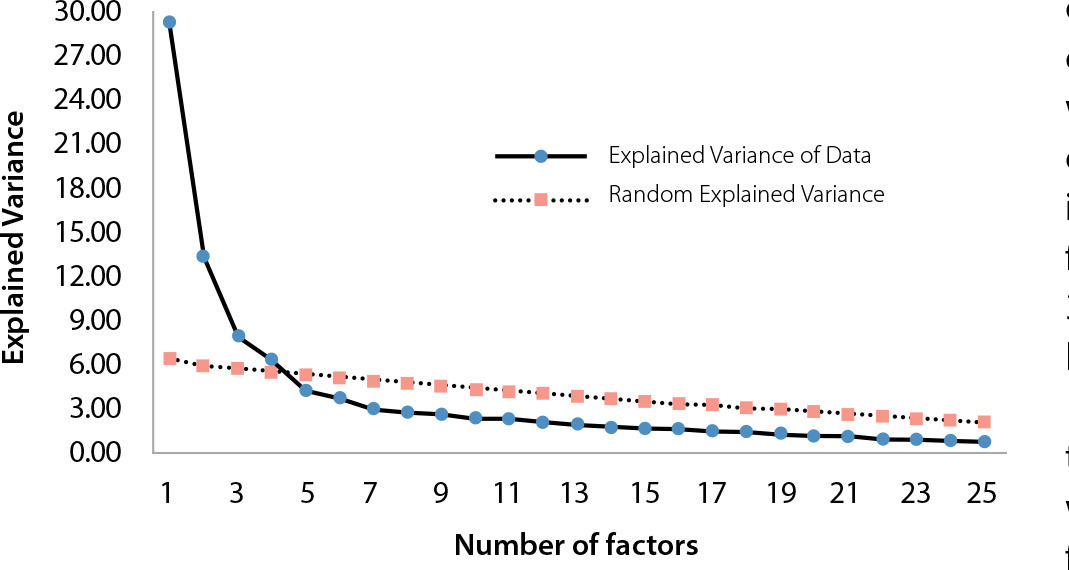
-
ORIGINAL ARTICLE07-29-2024
Nurses’ perspectives on nurses’ work methods
Revista Brasileira de Enfermagem. 2024;77(3):e20230374
Abstract
ORIGINAL ARTICLENurses’ perspectives on nurses’ work methods
Revista Brasileira de Enfermagem. 2024;77(3):e20230374
DOI 10.1590/0034-7167-2023-0374
Views0See moreABSTRACT
Objectives:
To analyze nurses’ perspectives on nurses’ work methods in the hospital context.
Methods:
A descriptive study with a qualitative approach was conducted in a hospital in northern Portugal, involving 17 nurses. Semi-structured interviews were used for data collection. Data collected between May and June 2023 underwent content analysis, supported by Atlas.ti software.
Results:
Three thematic areas emerged: “Nurses’ work methods in a hospital context,” highlighting the conception and components of work methods and the methods in use; “Implementation of nurses’ work methods,” emphasizing influencing factors and challenges to implementation; and “Impact of nurses’ work methods on patients, nurses, and institutions.”
Final Considerations:
Nurses’ work methods constitute the structure of nursing care. Some factors influence and some challenges arise in the implementation of these methods, producing impacts on patients, nurses, and institutions.

-
ORIGINAL ARTICLE07-29-2024
Nursing Process for institutionalized older adults: contributions from knowledge awareness workshop
Revista Brasileira de Enfermagem. 2024;77(3):e20230349
Abstract
ORIGINAL ARTICLENursing Process for institutionalized older adults: contributions from knowledge awareness workshop
Revista Brasileira de Enfermagem. 2024;77(3):e20230349
DOI 10.1590/0034-7167-2023-0349
Views0See moreABSTRACT
Objective:
To analyze the knowledge of professionals working in a Nursing Home about the Nursing Process before and after the awareness workshop.
Methods:
This is strategic action research, developed with nursing professionals and managers of a Nursing Home in Rio Grande do Sul, Brazil. Data were collected between January and June 2023, through semi-structured interviews before and after an awareness workshop. Discursive textual analysis of the data was carried out.
Results:
The central category “Understanding about the Nursing Process in Nursing Homes” emerged, which was unitized into two units of meaning and three categories of analysis.
Conclusion:
Data revealed non-use and lack of knowledge of the Nursing Process before awareness raising. Afterwards, a deeper understanding of the topic and its importance was identified. Awareness-raising workshops contribute to transformation of knowledge.
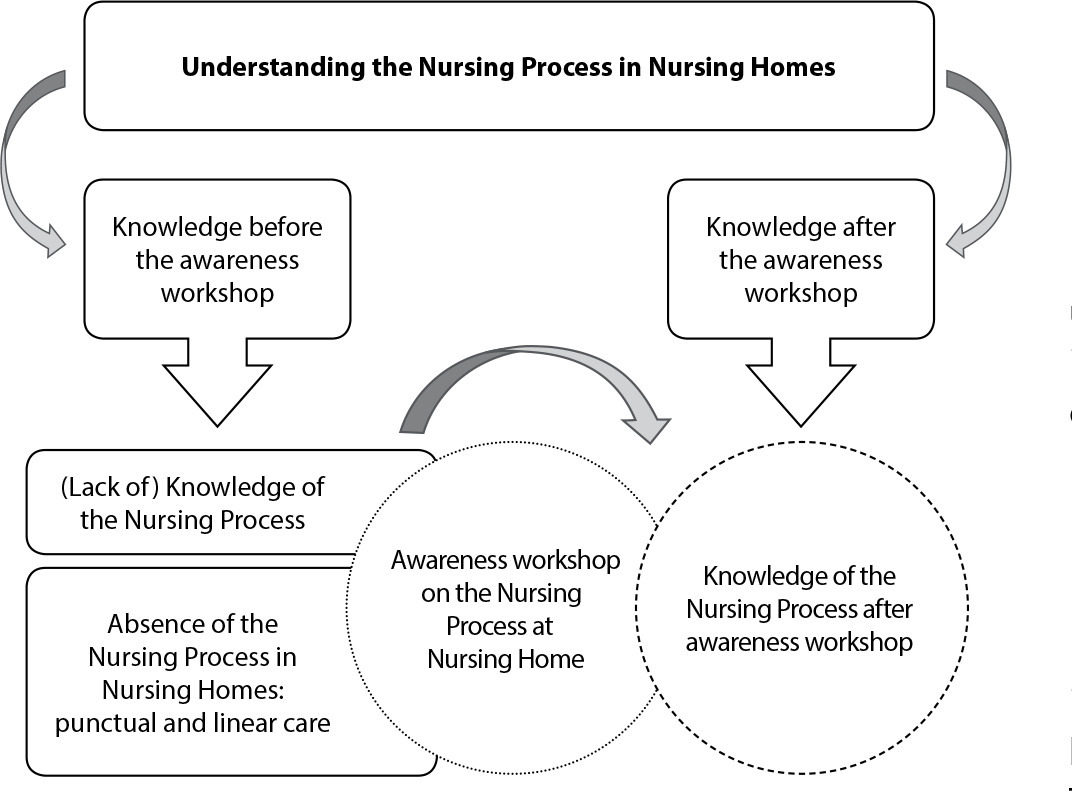
-
ORIGINAL ARTICLE07-29-2024
Excessive daytime sleepiness in nursing technicians: association with sleep quality and memory
Revista Brasileira de Enfermagem. 2024;77(3):e20230332
Abstract
ORIGINAL ARTICLEExcessive daytime sleepiness in nursing technicians: association with sleep quality and memory
Revista Brasileira de Enfermagem. 2024;77(3):e20230332
DOI 10.1590/0034-7167-2023-0332
Views0See moreABSTRACT
Objective:
to investigate excessive daytime sleepiness prevalence among nursing technicians and the association with sleep quality and memory.
Methods:
a cross-sectional, inferential study, carried out in a hospital unit in the state of Goiás between December 2020 and January 2021. Assessments were carried out using the Epworth Sleepiness Scale, the Pittsburgh Sleep Quality Index and the Prospective and Retrospective Memory Questionnaire, instruments validated for the Brazilian context. Bivariate and multivariate logistic regression analyzes were performed.
Results:
the sample consisted of 189 nursing technicians with a 40.9% excessive daytime sleepiness prevalence. In multivariate models, excessive daytime sleepiness was not associated with sleep quality, however there was a significant association with overall memory failures.
Conclusions:
study results demonstrate a high excessive daytime sleepiness occurrence, an association with overall memory failures and the need for psychosocial interventions for nursing technicians.
-
ORIGINAL ARTICLE07-29-2024
Educational technology for multidisciplinary training for managing waiting lists for elective patients
Revista Brasileira de Enfermagem. 2024;77(3):e20230299
Abstract
ORIGINAL ARTICLEEducational technology for multidisciplinary training for managing waiting lists for elective patients
Revista Brasileira de Enfermagem. 2024;77(3):e20230299
DOI 10.1590/0034-7167-2023-0299
Views1See moreABSTRACT
Objectives:
to construct and assess an educational technology for managing patient waiting lists for multidisciplinary training.
Methods:
study supported by Instructional Design – ADDIE model, whose stages of construction of educational technology were developed in the form of a multi-professional training course. Its respective content assessment was carried out by a committee of experts from 2021 to 2022. The analysis occurred based on the proportion of content adequacy with 95% Confidence Interval.
Results:
seventeen products were created as educational technology learning objects: five storyboards; four videos; three comic books; two pedagogical action plans; a mind map; and a YouTube® playlist. Nine experts assessed content adequacy, which reached 0.89.
Conclusions:
this educational technology contributes to the performance of professionals who manage waiting lists by reducing inequalities, alleviating differences, in addition to promoting equity in care and good health for patients in the Brazilian Health System.

-
ORIGINAL ARTICLE07-29-2024
Fuzzy Logic: vulnerability of women who have sex with women to sexually transmitted infections
Revista Brasileira de Enfermagem. 2024;77(3):e20230271
Abstract
ORIGINAL ARTICLEFuzzy Logic: vulnerability of women who have sex with women to sexually transmitted infections
Revista Brasileira de Enfermagem. 2024;77(3):e20230271
DOI 10.1590/0034-7167-2023-0271
Views0See moreABSTRACT
Objective:
To describe the possibility of applying Fuzzy Logic in analyzing the vulnerability of Women Who Have Sex with Women to Sexually Transmitted Infections/HIV/AIDS.
Methods:
We developed a Fuzzy Logic system with 17 input variables and one output variable, using data related to vulnerability in a municipality located in the Midwest region of the State of São Paulo, Brazil.
Results:
The factor with the greatest positive impact was the confirmation that a low understanding of Sexually Transmitted Infections/HIV/AIDS is associated with higher vulnerability. Conversely, the statement “Not disclosing sexual activity to healthcare professionals,” where individuals do not admit to having sex with women, had the least impact.
Conclusions:
Fuzzy Logic facilitates the identification of vulnerability, expressed through the analysis of interaction between variables in each dimension. This makes it a promising method to assist in analyzing the vulnerability of specific populations.
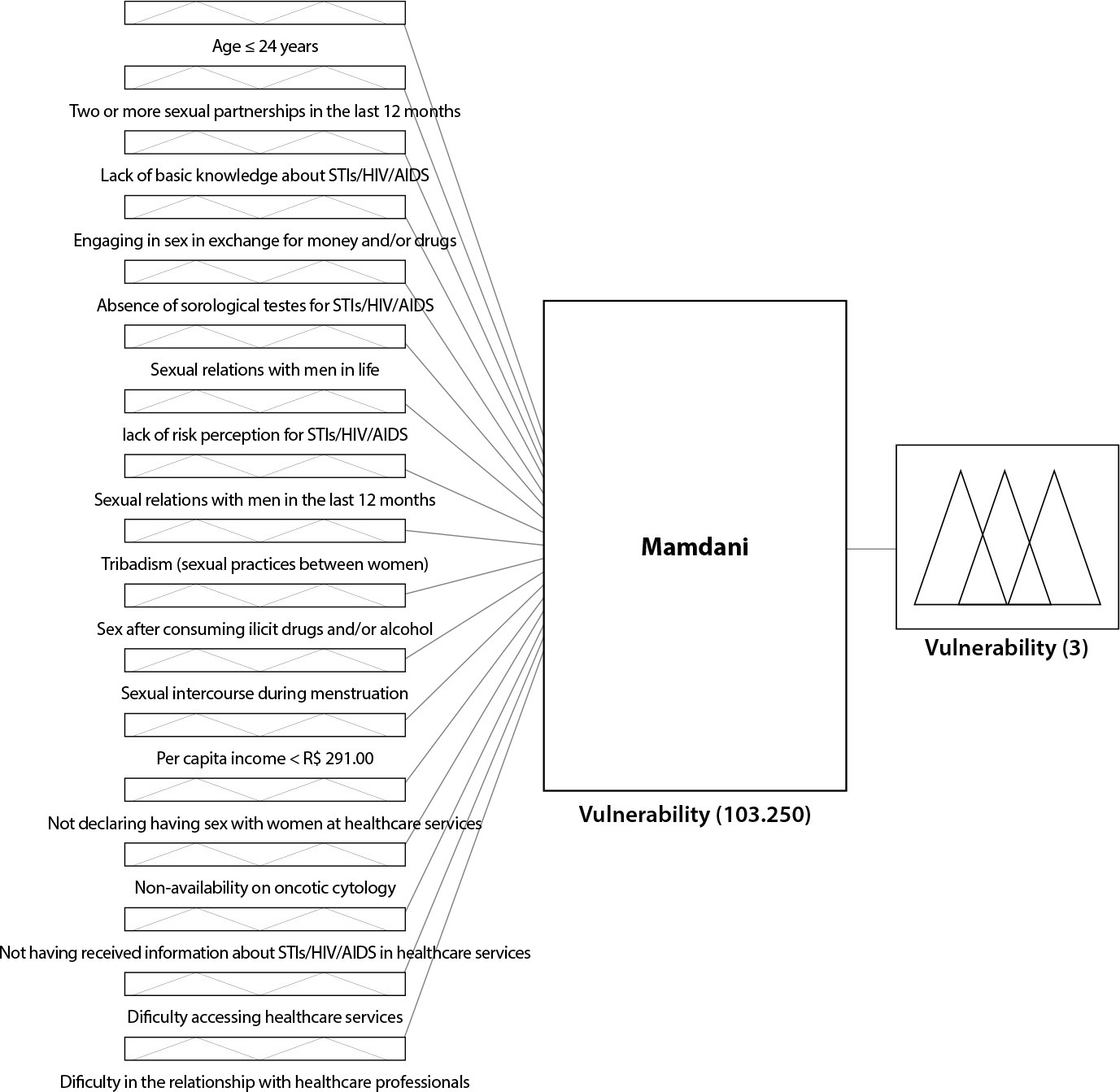
-
ORIGINAL ARTICLE07-29-2024
University Student Depression Inventory, Brazilian Version, Construct Assessment
Revista Brasileira de Enfermagem. 2024;77(3):e20230232
Abstract
ORIGINAL ARTICLEUniversity Student Depression Inventory, Brazilian Version, Construct Assessment
Revista Brasileira de Enfermagem. 2024;77(3):e20230232
DOI 10.1590/0034-7167-2023-0232
Views0See moreABSTRACT
Objectives:
to assess the University Student Depression Inventory, Brazilian version (USDI-BR), construct.
Methods:
a methodological study carried out with a snowball probabilistic sample, consisting of 334 undergraduate and graduate students. Confirmatory factor analysis, reliability using McDonald’s omega coefficient and Cronbach’s alpha were performed. Principal component analysis was performed using the varimax rotation and oblimin rotation, using the Kaiser-Meyer-Olkin criteria, Bartlett’s test of sphericity and scree plot.
Results:
the USDI-BR presented an internal consistency of items of ω = 0.95 and remained with 30 items, with the addition of 1 factor (Death wish and social withdrawal), totaling 4 factors.
Conclusions:
the USDI-BR has evidence that points to its validity and also its internal consistency, deserving that new studies be carried out to expand the evidence of its psychometric properties.
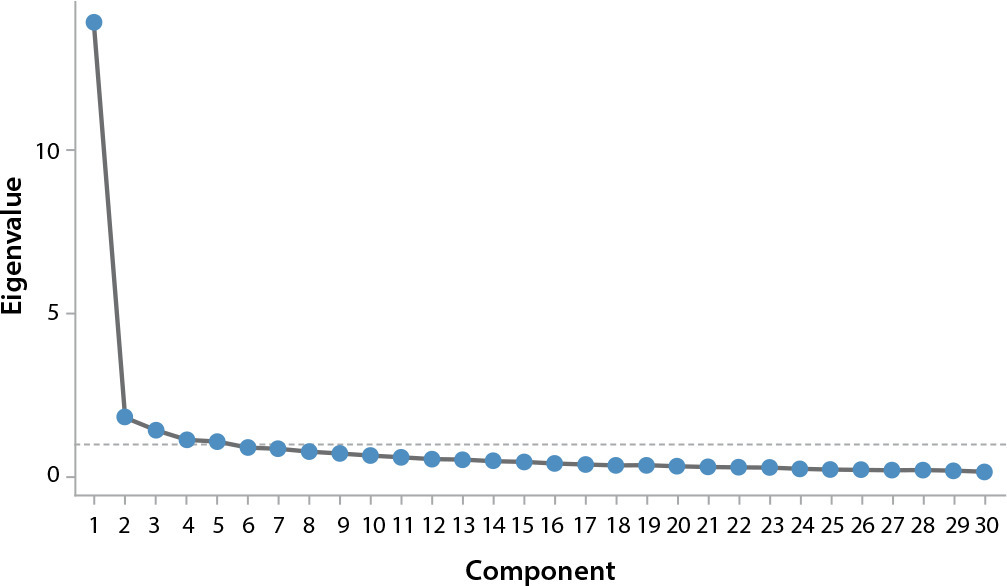
-
ORIGINAL ARTICLE07-29-2024
Family refusal of skin donation for transplantation: trends and associated factors
Revista Brasileira de Enfermagem. 2024;77(3):e20230209
Abstract
ORIGINAL ARTICLEFamily refusal of skin donation for transplantation: trends and associated factors
Revista Brasileira de Enfermagem. 2024;77(3):e20230209
DOI 10.1590/0034-7167-2023-0209
Views0See moreABSTRACT
Objectives:
to analyze the trends and factors associated with family refusal of skin donation for transplantation.
Methods:
this cross-sectional study was conducted in the State of São Paulo, with family authorization terms collected from 2001 to 2020. The variables analyzed included year, age, gender, cause of death, and type of institution. Data were analyzed using linear and multiple logistic regression, with the Odds Ratio estimated at p<0.05 for statistical significance.
Results:
1,355 individuals refused skin donation. The trend of refusals decreased between 2001 and 2009 in the age groups of 0-11 years and 12-19 years, but increased in the group aged ≥60 years. This trend continued to decrease in the 0-11 years group from 2010 to 2020, and increased in the 20-40 years group. Males and the age groups of 20-40 years, 41-59 years, and ≥60 years exhibited 27%, 34%, 47%, and 53% lower chances of refusal, respectively.
Conclusions:
there is an urgent need for measures to mitigate the high number of refusals associated with skin donation.
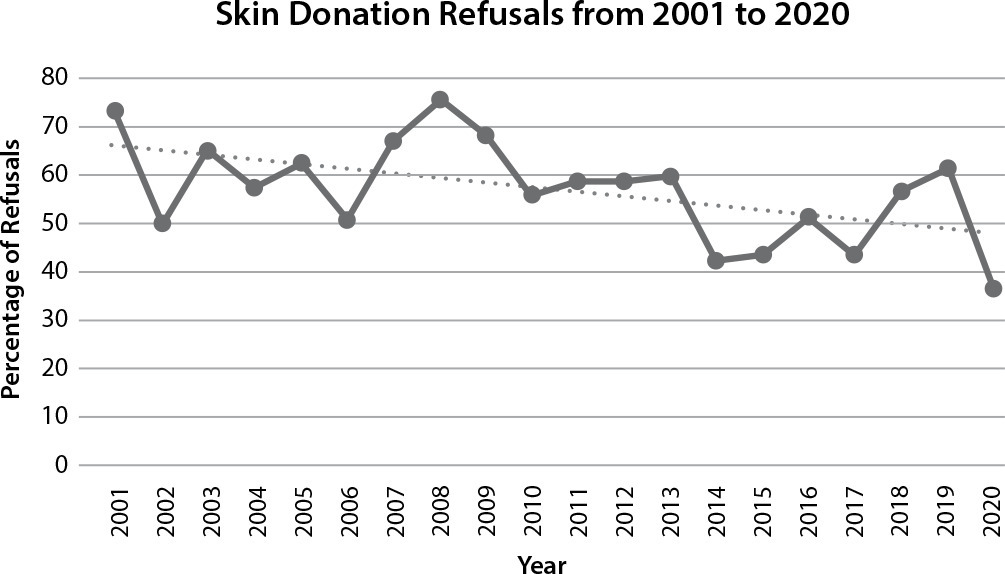
Search
Search in:
Nuvem de Tags
Adolescente (85) Atenção Primária à Saúde (239) COVID-19 (91) Criança (91) Cuidados de Enfermagem (269) Educação em Enfermagem (151) Educação em Saúde (139) Enfermagem (930) Enfermagem Pediátrica (86) Estudantes de Enfermagem (77) Estudos de Validação (131) Família (87) Idoso (208) Promoção da Saúde (99) Qualidade de Vida (104) Saúde do Trabalhador (86) Saúde Mental (145) Saúde Pública (82) Segurança do Paciente (150) Tecnologia Educacional (100)



